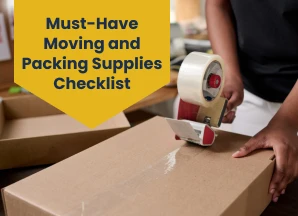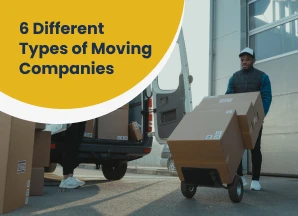Do’s & Don’ts in Commercial Move

Are you ready to move your office without the headaches? Do you think it’s just about packing boxes and relocating furniture? Think again. A commercial move involves much more than just changing locations - it’s about keeping your business on track while managing a complex logistical puzzle.
From coordinating with your team to hiring the right office relocation company, there are plenty of moving parts to juggle. One wrong move can lead to delays, damaged equipment, or costly mistakes. But don’t worry - we’re here to help!
Let’s cover the Do’s and Don’ts of office moves to ensure your transition is smooth, efficient, and stress-free.
Do's for a Smooth Commercial Relocation
1. Start Planning Early
Begin organizing your commercial move as soon as you can. The earlier you begin, the more time you’ll have to hire an office relocation company, coordinate logistics, and make sure your employees are prepared for the change.
By starting early, you can break everything down into smaller tasks and avoid last-minute chaos. Create a moving checklist and assign tasks to different team members. This will help you stay on track.
2. Hire a Professional Commercial Mover
One of the smartest things you can do for a smooth move is to hire professional commercial movers. An experienced moving service is equipped with the expertise and resources needed to manage all stages of the move, including packing, transporting, and unloading your office items safely.
When looking for an office relocation company, choose one with a solid reputation and experience in commercial moves. Check reviews and ensure they are properly licensed and insured. A professional moving company will ensure that your office, including heavy furniture, fragile equipment, and electronics, is transported safely and efficiently.
TIP: When it comes to moving your office, Van Lines Move is the partner you can rely on. We know that every business has its own set of needs, which is why we provide personalized relocation solutions that ensure minimal disruption and maximum efficiency. With a team of experienced commercial movers, we make sure your transition is as smooth as possible so you can focus on growing your business, not moving it.
3. Label Everything
Proper labeling is a crucial part of staying organized during a commercial move. Label each box and item clearly with the room or department it belongs to. For example, write “Accounting Department” or “Server Room – Fragile” on boxes containing sensitive materials.
Clear labeling makes the unpacking process in your new office much easier. It’ll help your team get everything in the right place quickly, without the need for constant searching or confusion.
Get to know how you can label boxes for moving!
4. Notify Your Clients and Vendors Early
Communication is essential. Keep your clients, vendors, and business partners informed about your office relocation well in advance. Notify them about your new address, phone number (if applicable), and any changes in business hours or services.
The last thing you want is for your clients to show up at the old address or send shipments to the wrong location. Send out notifications, update your website, and make sure your social media pages reflect the change.
5. Back Up All Important Data
The office relocation process affects your employees too. Don’t forget to consider their needs and comfort throughout the move. Make sure they understand the timeline and help them adjust to the new space.
If the move involves significant changes to office layout or processes, make sure to involve your employees early. When your team feels prepared, it’ll be easier for everyone to transition into the new office smoothly.
Don’ts to Avoid Pitfalls During Your Commercial Move
1. Don’t Leave It to the Last Minute
A common mistake businesses make is leaving their office move to the last minute. Procrastination can lead to unnecessary stress, confusion, and mistakes. A rushed move rarely goes smoothly.
Plan well in advance. Starting early will give you time to hire the best office relocation company, coordinate with your team, and manage the logistics without feeling pressured. The more time you have to prepare, the easier the process will be.
2. Don’t Forget About Your IT Equipment
When planning an office relocation, don’t overlook your IT equipment. Computers, servers, and other technology need special care and attention. These items are often the backbone of your business, so it’s important to ensure they’re moved safely.
Avoid the temptation to handle the tech on your own. Work with professionals who are experienced in moving office technology. This will protect your equipment from damage and minimize the risk of data loss.
3. Don’t Pack Everything
An office relocation is the perfect time to declutter. Don’t waste time packing things you no longer need. Take inventory of your office supplies, furniture, and equipment, and get rid of anything outdated or unnecessary.
By decluttering before the move, you’ll save time, space, and money. Consider donating old office furniture or equipment that’s still in good condition, or simply dispose of items that are no longer useful. The less you have to move, the easier the entire process becomes.
4. Don’t Move Without Proper Insurance
Even the best office relocation company can encounter accidents. Whether it’s a piece of furniture getting damaged or something being misplaced during the move, insurance is essential.
Don’t skip this step. Be sure your moving company provides coverage for any potential damage or loss. Ask about different insurance options and choose one that will give you peace of mind during the entire relocation process.
Get Insurance with a Top Moving Company!
5. Don’t Overlook Employee Needs
The office relocation process affects your employees too. Don’t forget to consider their needs and comfort throughout the move. Make sure they understand the timeline and help them adjust to the new space.
If the move involves significant changes to office layout or processes, make sure to involve your employees early. When your team feels prepared, it’ll be easier for everyone to transition into the new office smoothly.
Related Articles:
- Why Do You Need Commercial Movers for Your Business Relocation?
- How to Plan a Long-Distance Office Move with Commercial Movers
- 10 things to keep in mind while moving office
A successful commercial move depends on careful planning and the right help. By following these tips, you can ensure a smooth office relocation with minimal disruption.
Choose a trusted moving company, start planning early, and stay organized to keep your move on track. With the right strategy, your move will set the stage for growth and success in your new space.
Categories
- Long Distance Moving145
- Local Moving116
- Commercial Moving38
- Residential Moving30
- Last – Minute Moving25
- Furniture Moving8
- Moving Cost Calculator5
- Piano Moving3
- Car Transportation3
- Truck Rental3
- Moving Cost3
- Local Move3
- best moving rates3
- cheap moving companies3
- affordable moving companies3
- Junk Removal2
- Senior Moving2
- Senior Relocation Moving Companies2
- Moving Tools2
- Moving Estimates2
- Moving companies2
- Moving services2
- state to state movers2
- Heavy Equipment1
- Moving Container1
- Senior Moving Services1
- moving tips1
- office moving1
- office relocation1
- employee relocation1
- Car Transport1
- Vehicle Shipping1
- Car Shipping Services1
- Artificial Intelligence1
- Office Moving Services1
- Commercial Moving Companies1
- Corporate Moving Services1
- Corporate Movers1
- interstate moving1
- full-service movers1
- full-service moving companies1

 Local Movers
Local Movers Last-Minute Movers
Last-Minute Movers Junk Removal
Junk Removal Long Distance Movers
Long Distance Movers Piano Movers
Piano Movers Heavy Equipment
Heavy Equipment Commercial Movers
Commercial Movers Moving Container
Moving Container Car Transportation
Car Transportation Furniture Movers
Furniture Movers Truck Rental
Truck Rental Moving Cost Calculator
Moving Cost Calculator Moving Planner
Moving Planner Packing Calculator
Packing Calculator Moving Checklist
Moving Checklist Moving Insurance
Moving Insurance FAQ
FAQ Contact Us
Contact Us Moving Loan
Moving Loan About Us
About Us








